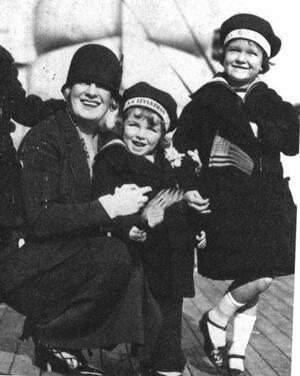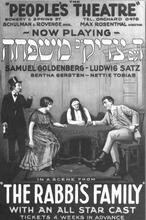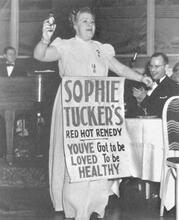Nora Bayes
A talented and popular vaudeville star, Nora Bayes became an example of the limits of women’s power in the early twentieth century when her attempts to command respect from producers backfired. Bayes performed in small vaudeville venues for several years before opening the billing at the Palace Theatre in London in 1905 and becoming part of the Ziegfeld Follies in 1907. Her higher salary and imperious attitude led to friction in her marriage, and her growing confidence led Bayes to challenge producers. She earned success on the Keith vaudeville circuit in 1914 before her fights with Keith caused her to break her contract. Bayes recorded “Over There” in 1917 and launched a one-woman show later that year. She continued to perform in vaudeville until 1927.
Nora Bayes was an international singing star in vaudeville and musical comedy during the first twenty-five years of the twentieth century. Known as a willful and temperamental star, Bayes relied on her own charisma and popularity as she resisted managerial control and ignored the details of legal contracts. These traits and tactics matched those of other famous female vaudevillians such as Eva Tanguay who also refused to follow the rules set by theater administrators. In these battles with male businessmen and in her unconventional personal life, Bayes provides some flamboyant, indeed extreme, examples of the broad social changes happening in the United States in the early twentieth century, namely the questioning of traditional roles for women as well as the challenges to male political and economic power that marked the women’s movement of the time.
Early Life
Born to Elias and Rachel (Miller) Goldberg, she was originally named Dora but changed her name many times for her theatrical career before settling on Nora Bayes. The date of her birth and other details about her early life are sketchy. She gave Los Angeles as her place of birth, but other accounts list her birthplace as Chicago or Milwaukee. When Bayes was approximately eighteen years old and married to her first husband, Otto Gressing, an undertaker, she began to pursue her dream of a theatrical career. While living in Joliet, Illinois, with Gressing, she performed at amateur night at Hopkins’ Theater in Chicago. Thus began a stage career as tumultuous and unpredictable as her personal life.
Performance Career
After performing for several years in vaudeville in the United States and earning acclaim with the hit song “Down Where the Wurzburger Flows,” written by Harry von Tilzer in 1902, she opened the bill at the Palace Theatre in London, England, in November 1905. When she returned to the United States, Florenz Ziegfeld helped establish her as a star when he recruited her for his Follies of 1907. Enjoying great success in the theater, Bayes divorced Gressing and married singer and dancer Jack Norworth in 1908. Bayes and Norworth then starred together in the Follies of 1908, which included a song they had written together—“Shine On, Harvest Moon.” Though Bayes and Norworth worked well together on stage, their life offstage was strained. Bayes, who commanded higher salaries than Norworth, often treated him as her servant and resented his flirtations with other women.
Confident in her growing popularity, Bayes began to challenge the authority of theater managers and producers. She angered Florenz Ziegfeld, for example, when she walked out of the Follies of 1909 largely because of her jealousy over the success of Sophie Tucker’s performance in this show. After Ziegfeld brought an injunction against Bayes that prevented her from performing for several months, Bayes returned to vaudeville even more popular than before, earning $2,500 a week. Critics noted that Bayes succeeded through her lush singing voice, her sensitivity to her audience’s tastes, and her willingness to make fun of herself, including jokes about her Jewish background and her failed marriages.
Late Career and Marriages
Divorced from Norworth in 1913, Bayes married Harry Clarke, an actor, that same year. This marriage dissolved only two years later. Bayes achieved great success on the Keith vaudeville circuit, including a prosperous tour in 1914, but she began to chafe under Keith’s powerful demands. Bayes broke her contract and thus gave up the lucrative bookings. Following her break with Keith, she launched her own two-hour, one-woman show in 1917, starred in the musical Ladies First in 1918, and then continued to perform in vaudeville in England and the United States through 1927.
Bayes’s fourth marriage—to actor Arthur Gordon (also known as Gordoni)—lasted two years, from 1920 to 1922. Her final marriage, in 1925, was to Benjamin Friedland, a wealthy New York businessman. She died of cancer at the Jewish Hospital in Brooklyn on March 19, 1928. She was survived by Friedland, her three adopted children (two boys and a girl), as well as brother Harry Goldberg and sister Ida Klein.
AJYB 24:117.
American Society of Composers, Authors and Publishers. ASCAP Biographical Dictionary. 4th ed. (1980).
Bayes, Nora. Clipping files. Harvard Theatre Collection, Harvard University Library, Cambridge, Mass., and Scrapbooks. Robinson Locke Collection, New York Public Library at Lincoln Center, NYC.
Claghorn, Charles Eugene. Biographical Dictionary of American Music (1973).
Ireland, Norma Olin. Index of Women of the World from Ancient to Modern Times (1970).
Kinkle, Roger D. The Complete Encyclopedia of Popular Music and Jazz, 1900–1950 (1974).
NAW; Obituaries. “Nora Bayes.” Variety, March 14, 1928, and NYTimes, March 20, 1928, 27:3.
Samuels, Charles, and Louise Samuels. Once Upon a Stage: The Merry World of Vaudeville (1974).
Slide, Anthony, ed. Selected Vaudeville Criticism (1988).
UJE; Westerfield, Jane T. “An Investigation of the Life Styles and Performance of Three Singer-Comediennes of American Vaudeville: Eva Tanguay, Nora Bayes and Sophie Tucker.” Ph.D. diss., Ball State University (1987).
Who Was Who in the Theatre: 1912–1970 (1978).





